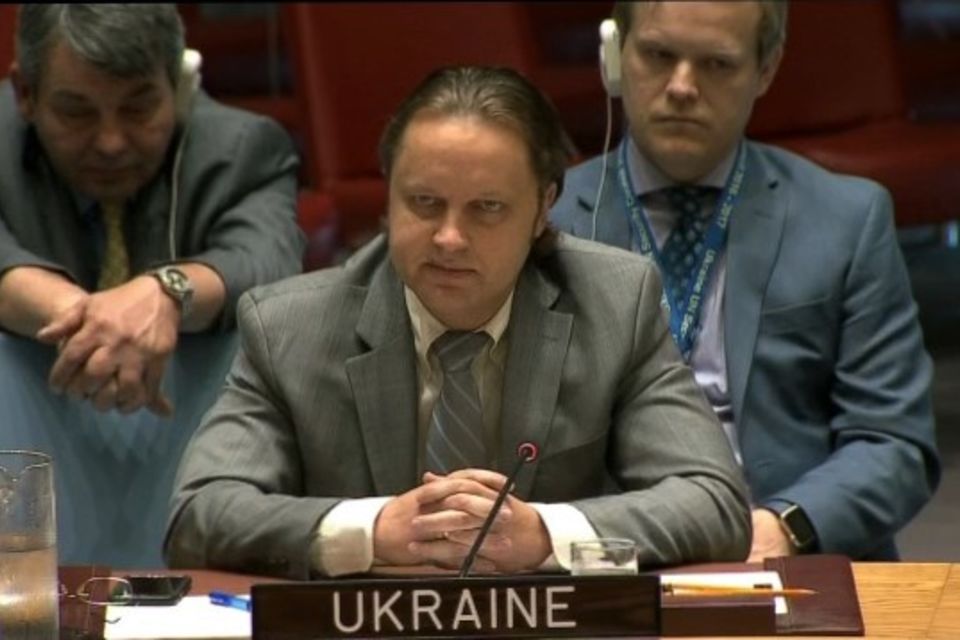Statement by the delegation of Ukraine at the UN Security Council debate on BiH

(18 May 2017)
Mr. President,
I thank High Representative for Bosnia and Herzegovina Mr.Valentin Inzko for his briefing and express Ukraine's full support of his activities. I would like to underscore that in current circumstances of political instability and internal tensions his role and leadership become even more important.
Despite the Security Council's efforts and calls on the competent authorities in Bosnia and Herzegovina to work actively to consolidate the results of the political process, engage in dialogue to settle their differences and comprehensively implement the Dayton Peace Agreement, the internal situation in this country remains tense with a risk for further escalation. The need to overcome selfish interests and ethnic divisions and reach necessary progress in implementation of the “5 +2” agenda is as pressing as never before.
In this regard, Ukraine condemns the decision of the Republica Srpska authorities to cease all communications and contacts with the Office of High Representatives as well as their denial of access to official information and documents. I would like to underline that such actions violate the General Framework Agreement for Peace and relevant Security Council Resolutions and are unacceptable.
Unfortunately, Bosnia and Herzegovina is not unique in this regard. Political tensions are becoming new normal for the whole region. Two days ago, the Council discussed a difficult situation in Kosovo. In the last few months we have witnessed tensions and even an attempted coup d’état in the Balkans. All these developments demonstrate that the shift from a “post-conflict” to a “pre-conflict” environment in the region is, unfortunately, still possible.
Of course, the problems and challenges of each country are very different and sometimes incomparable. But their roots are rather similar. Quite often internal tensions are stoked up by certain external players, who stir up instability in the Balkans to reverse European and Euroatlantic integration of the region and to keep the Balkan states in the imagined “sphere of influence”. It is an irresponsible policy to conduct in the region as complex as the Balkans.
Mr. President,
I recall the Council's discussion before and after the adoption of the resolution 2315 in November 2016. Ukraine and many other Council members then strongly condemned the holding of a referendum by the authorities of Republica Srpska which was in clear contravention of final and binding decisions of the Constitutional Court. Despite this condemnation and calls for restraint as well as annulment of results of this so-called referendum by BiH’s Constitutional Court, the Republica Srpska authorities continued their provocative actions violating the General Framework Agreement for Peace. These actions include the “Republica Srpska Day” celebrations with the participation of the army’s Third Infantry Regiment, adoption of the Law on “Republica Srpska Day”, divisive rhetoric and threats of cessation, rejection of authority of the High Representative and many others.
I would like to remind that during preparation of that resolution Ukraine and other members insisted on the inclusion of condemnation of the so-called referendum as this would have sent a strong and clear signal to the authorities of the Republica Srpska. As you know, this did not happen due to opposition by the Russian delegation. One can ask – why the Russian Federation was so much against this suggestion?
Now in light of the recent developments in Bosnia and Herzegovina, the answer is obvious. Failure to take clear unified steps against separatist actions by the leaders of the Republika Srpska in violation of the Dayton agreement challenges the sovereignty and territorial integrity of Bosnia and Herzegovina and may lead to destabilization of the Balkans. Thus, it would create a new, big hole in the famous “instability belt” crafted by Russia.
Ukraine joins the High Representative's call and underscores that “the entities have no right to secede from BiH and that the General Framework Agreement for Peace guarantees the sovereignty and territorial integrity of Bosnia and Herzegovina and the constitutional position of the entities.”
Mr.President,
We are encouraged that despite all these negative developments, during the reporting period we also witnessed substantial progress of Bosnia and Herzegovina on its path to European and Euro-Atlantic integration. In particular, I commend the adoption of the long overdue defence review and the signing of the Protocol on the adaptation of the Stabilization and Association Agreement with the European Union.
We are also looking forward to the EU Commission Opinion on BiH EU membership application and hope that it will get the status of a candidate country in the nearest future.
Ukraine commends the European Union mission EUFOR Althea for its efforts to enable the security forces of Bosnia to operate in an independent manner and to participate in building a peaceful society. We are looking forward to a strategic review of the European Union on this issue.
It is important to continue efforts to implement the Reform Agenda, which includes socioeconomic issues, the rule of law and public administration reforms. Of equal significance is to demonstrate progress in the functioning of the judiciary and in the fight against corruption, organized crime, radicalization and terrorism.
Such progress is essential for further stability and development of Bosnia and Herzegovina and of the whole region.
I thank you.
